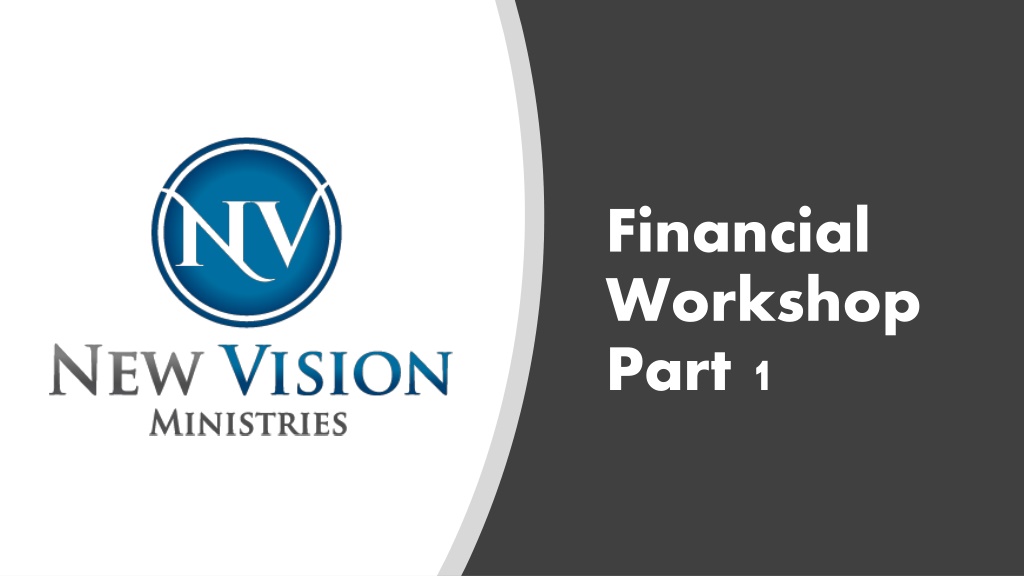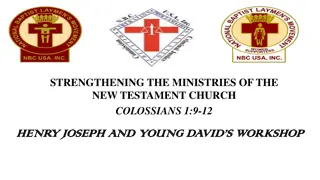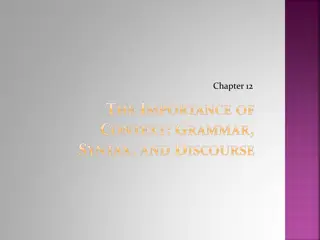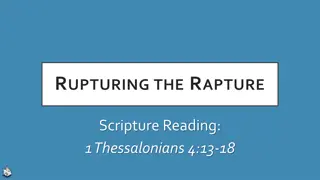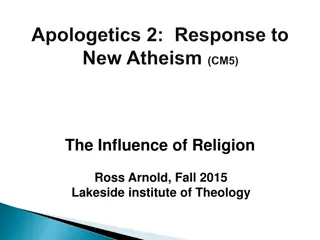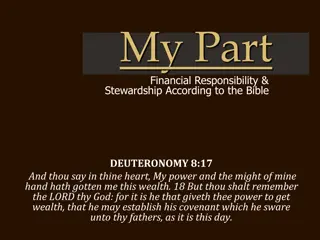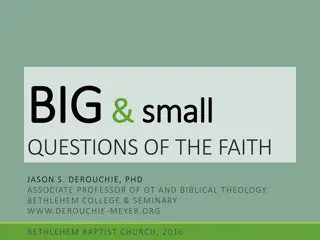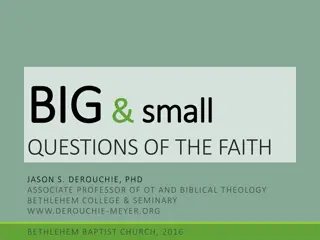Biblical Financial Workshop: Strategies for Financial Success Based on Principles
Providing a comprehensive guide on managing finances according to biblical principles, this workshop highlights key strategies such as giving tithes, managing bills, saving systematically, and living within means. With references to Bible verses, it emphasizes concepts like stewardship, planning, growth, and legacy building. The importance of a relationship with God in financial matters, including obedience, gratitude, and spiritual investment, is also highlighted.
Download Presentation

Please find below an Image/Link to download the presentation.
The content on the website is provided AS IS for your information and personal use only. It may not be sold, licensed, or shared on other websites without obtaining consent from the author. Download presentation by click this link. If you encounter any issues during the download, it is possible that the publisher has removed the file from their server.
E N D
Presentation Transcript
Financial Workshop Part 1
Purpose: The purpose of this Workshop is to provide financial strategies that will positively impact your finances based on biblical principles.
Give your tithes and offerings - Necessary Biblical Principle Pay your bills on time Good Stewardship 5 Financial Principles on Good Stewardship to walk/live out Live within your means be responsible over your financial resources Save systematically in various forms with a savings goal daily: Spend wisely and responsibly strategically use your financial resources
Proverbs 12:27 Hard work pays Proverbs 21:20 We should save Luke 12:47-48 We should increase what we are given. Deuteronomy 25:13 15/ Psalm 112:5 Be honest in our dealings Deuteronomy 16:17 Give as you are able What Does the Bible Say About Money?
Plan (Luke 14:28-30) Planning should start with prayer (Jeremiah 29:11) Understand where you are (Proverbs 27:23) Use available resources (Proverbs 15:22)(Proverbs 19:2) Protect/Stewardship (Proverbs 27:23) Live within your means (Proverbs 22:7) Save for the unknown (Proverbs 21:20) Grow what we are given (Mathew 25:14-30) Provide (1 Timothy 5:8) Tithe (Proverbs 3:9-10) Legacy (Proverbs 13:22) Biblical Financially Sound Principals
Relationship With God Demonstrates obedience Demonstrates gratitude Demonstrates respect Spiritual Savings/Investment God s rate of return is unmatched (Proverbs 3: 9-10) Provisions during hard times (Deuteronomy 14:28-29) Accomplish the goals of ministry Provide for the physical needs of the church. Tithing & Giving
Gods plan What does God have planned for me? His will versus our will Paint the picture of our future Understanding my finances How much money am I generating? Where is my money going? Paint the truthful picture of my present Budget Roadmap from present to future Requires discipline and delayed gratification Have A Plan
The foundation of your finances should be to have a budget
How do you define a budget?
A budget is a plan you write down to decide how you will spend your money for a set period of time; example: daily, weekly, bi-weekly and/or monthly. Or you can define it as a spending plan on income and expenses. Simply said:
How to Budget Be Honest- Look through old statements to get actual values to help identify the problem areas in your budget Be Thorough- Include EVERYTHING, even gifts Be Willing to Sacrifice the Now for the Future - Starbucks vs. Debt Freedom; Nikes vs. College Tuition Budget Goals Income should be more than Expenses Reduce/Eliminate Debt Increase Savings Include Dreams(Homeownership/New car/Vacation/Retire) Budget
Recommended Budget Percentages (50/20/10/20 Rule) 50% Essentials Home less than 28% ($1,166/mth for $50k/yr) Debts(car/loans/credit card) less than 10% ($416/mth for $50k/yr) Bills(Utilities/Gas/Insurance)less than 12% ($500/mth for $50k/yr) 20% Savings/Investments Savings/Investments greater than 20% (832/mth for $50k/yr) Includes 401k/Life Insurance 10% Tithes Tithe equals 10% (ie $416/mth for $50k/yr) 20% Discretionary Wants(Vacation/Shopping) 20% (ie $832/mth for $50k/yr) Budget Continued
Pay your bills first Consider splitting large bills across pay checks Consider fixed payments for utilities Overestimate taxes Use Cash For Discretionary Spending Fun Money - Eating out/Manicures/Date Night Keep Receipts and Balance Weekly Plan Ahead Prepare meals for the kids before leaving the house Pack a lunch the night before/and prepare snacks Know what s on the calendar (special events/ holidays/ travel) Don t Overpay for Big Purchases 20/3/8 Car Purchase Rule 20% Down/ 3 Year Finance/ Payment < 8% of Take Home Income $50k/yr = $18K Car ($3.6K down; 3yr; $400/mth) How Do I Stay on Budget?
Some of the ways of reducing expenses: Reducing Expenses for a positive outcome.. Groceries--visit New Vision Ministries food pantry; this can significantly reduce your grocery bill and increase your disposable income; reduce the number of times you eat out a week by 50%. Entertainment sponsor a game night with your care group or other friends; take a scenic walk on a trail; check out a movie from the local library; temporarily suspend your Netflix subscription
More ways to reduce expenses: Reducing Expenses for a positive outcome... Self care have a in-day spa, give yourself a facial and aromatherapy bath while saving a nominal amount a week for a special spa day; look for promotion spa packages especially during holidays and your birthday. Travel/gas make a habit of having a list of items to purchase and visit the stores/places within close proximity of each other, an example would be: from New Vision Ministries to cracker barrel to Walmart, etc. which are within the same radius; whenever possible, make travel arrangements well in advance to get the best deals. continued
Save For Emergencies/Goals: Automate Savings Use a change jar and deposit into your savings account at the end of the week/month; Pay Yourself First!!! Build the Foundation for Wealth. Emergency Savings Prioritize $1k minimum, or enough to pay deductibles; whichever is greater. Financial Cushion 3 to 6 months of expenses in non checking account.
RECAP Let s Recap the financial principles shared
Give your tithes and offerings A necessary Biblical Principle Pay Pay your bills on time Good Stewardship Pay 5 Financial Principles to walk/live out: Save systematically in various forms with a savings goal Save Live within your means be responsible over your financial resources Lifestyle Spend wisely and responsibly strategically use your financial resources Spend
Next Week: Path to Financial Freedom Watch two of the following videos 5 Wealth Rules Finance 101 in your 20s Finance 101 in your 30s Finance 101 in your 40s Finance 101 in your 50s Retirement Catch-Up Then WRITE DOWN 3 steps you can take towards your B.A.G.s
This concludes New Vision Ministries Financial Workshop Part 1 QUESTIONS? We welcome your feedback and will use it to develop upcoming financial workshops.
